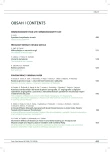Resection of Insular Gliomas – Volumetric Assessment of Radicality
Authors:
R. Bartoš 1,4; M. Sameš 1; A. Zolal 1; T. Radovnický 1; A. Hejčl 1; P. Vachata 1,4; F. Cihlář 2; D. Bejšovec 3; P. Petrovický 4
Authors‘ workplace:
Krajská zdravotní, a. s., Masarykova nemocnice v Ústí nad Labem, o. z.
Neurochirurgická klinika UJEP
1; Krajská zdravotní, a. s., Masarykova nemocnice v Ústí nad Labem, o. z.
Radiodiagnostické oddělení
2; Krajská zdravotní, a. s., Masarykova nemocnice v Ústí nad Labem, o. z.
Oddělení anestezie a intenzivní medicíny
3; Krajská zdravotní, a. s., Masarykova nemocnice v Ústí nad Labem, o. z.
Anatomický ústav 1. LF UK v Praze
4
Published in:
Cesk Slov Neurol N 2009; 72/105(6): 534-541
Category:
Original Paper
Overview
Aim:
The main aim of this work is to document the operability of insular gliomas and to evaluate the achieved radicality of resection exactly.
Patients and methods:
The prospectively studied patient group included eight patients harboring an insular glioma, who were operated on in the period of 18 months. The radicality of the resection was evaluated with the use of two methods. For quick evaluation, a simple ellipsoid approximation was used. A volumetric evaluation using semiautomatic segmentation was used as a precise, yet more elaborate method.
Results:
There was no permanent neurological morbidity in our study group. We could achieve an average 84% (56– 100%) tumor mass reduction. In the group of seven large and surgically complex WHO grade II and III gliomas, we achieved an average 82% tumor mass reduction (56– 94%). The semiautomatic segmentation volumetry showed minimal deviation of the measurements and it played a crucial role especially in residual tumor volume evaluation.
Conclusions:
There is no standard method for the treatment for low-grade insular glioma. As a general recommendation, we prefer an active and maximally radical approach, mainly due to the risk of undiagnosed anaplastic astrocytoma. The intraoperative motor evoked potentials monitoring and a meticulous microsurgical preparation of the middle cerebral artery branching, as well as the preoperative knowledge of the position of the lenticulostriate perforators are of utmost importance for the safety of the surgery.
Key words:
insula – glioma – magnetic resonance imaging – motor evoked potentials
Sources
1. Moshel YA, Marcus JD, Parker EC, Kelly PJ. Resection of insular gliomas: the importance of lenticulostriate artery position. J Neurosurg 2008; 109(5): 825– 834.
2. Yaşargil MG, von Ammon K, Cavazos E, Doczi T, Reeves JD, Roth P. Tumours of the limbic and paralimbic systems. Acta Neurochir 1992; 118(1– 2): 40– 52.
3. Yaşargil MG. Microneurosurgery, vol. 4. New York: Thieme Medical 1996.
4. Zentner J, Meyer B, Stangl A, Schramm J. Intrinsic tumors of the insula: a prospective surgical study of 30 patients. J Neurosurg 1996; 85(2): 263– 271.
5. Lang FF, Olansen NE, DeMonte F, Gokaslan ZL, Holland EC, Kalhorn C et al. Surgical resection of intrinsic insular tumors: complication avoidance. J Neurosurg 2001; 95(4): 638– 650.
6. Simon M, Neuloh G, von Lehe M, Meyer B, Schramm J.Insular gliomas: the case for surgical management. J Neurosurg 2009; 110(4): 685– 695.
7. Mehrkens JH, Kreth FW, Muacevic A, Ostertag CB. Long term course of WHO grade II astrocytomas of the Insula of Reil after I- 125 interstitial irradiation. J Neurol 2004; 251(12): 1455– 1464.
8. Neuloh G, Pechstein U, Schramm J. Motor tract monitoring during insular glioma surgery. J Neurosurg 2007; 106(4): 582– 592.
9. Duffau H, Capelle L, Lopes M, Faillot T, Sichez JP, Fohanno D. The insular lobe: physiopathological and surgical considerations. Neurosurgery 2000; 47(4): 801– 810.
10. Duffau H. A personal consecutive series of surgically treated 51 cases of insular WHO grade II glioma: advances and limitations. J Neurosurg 2009; 110(4): 696– 708.
Labels
Paediatric neurology Neurosurgery NeurologyArticle was published in
Czech and Slovak Neurology and Neurosurgery

2009 Issue 6
Most read in this issue
- The Variants of the Catatonia
- Rett Syndrome
- Mental Nerve Neuropathy as a Manifestation of Systemic Malignancy
- Carpal Tunnel Syndrome
